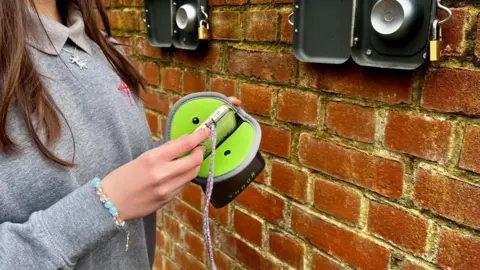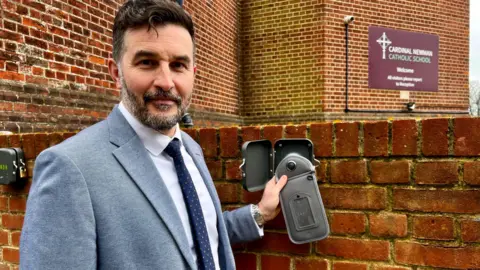Conference to discuss smartphone impact on children
 Sara Smith/BBC
Sara Smith/BBCLeaders from 34 schools in Brighton and Hove are to meet to discuss the impact smartphones have on children.
It follows schemes introduced to limit their usage during the school day – including one school that enforced a complete ban due to concerns over safeguarding.
Sarah Raymond, from the campaign group Smartphone Free Childhood, which has organised the conference on Thursday evening, says it is "too important an issue for us to say we can't do anything about it."
However, the group says children with medical conditions that require app usage are exceptions to the rule.
Since September students at Cardinal Newman Catholic School in Brighton have been told they must put their phones in pouches that are locked until the end of the day, and can only be unlocked with a magnetic device fixed to a wall.
Assistant headteacher Shaun Meaney said a voluntary ban in place during the previous academic year had not worked.
"The temptation of a phone buzzing in your pocket is too much for lots of our young people to resist," he said.
Mr Meaney said phones distracted students in class and were a safeguarding risk.
"There was also the danger of cyber bullying, taking pictures without consent and videos that could be compounded in a negative and unkind way."
 Sara Smith/BBC
Sara Smith/BBCSmartphone Free Childhood has claimed the parents of nearly 90,000 children in the UK have signed a pact, vowing not to buy their child a smartphone until they were 14 years old.
Ms Raymond, regional leader of the group, described smartphones as "addictive by design", highlighting sleep deprivation and cyber bullying as issues.
"They are experience blockers. Children need to be in the real world," she said.
"We know that the younger they are given a smartphone, the worse their mental health is.
"Smartphones are a gateway to harmful content, whether that be pornography [or] violent content," Ms Raymond said.
"It's not the kind of thing you would show children in the real world."
However, Smartphone Free Childhood said if a child with diabetes needed to use an app to regulate their insulin levels, or any other medical condition, they should use one.
Follow BBC Sussex on Facebook, on X, and on Instagram. Send your story ideas to [email protected] or WhatsApp us on 08081 002250.
